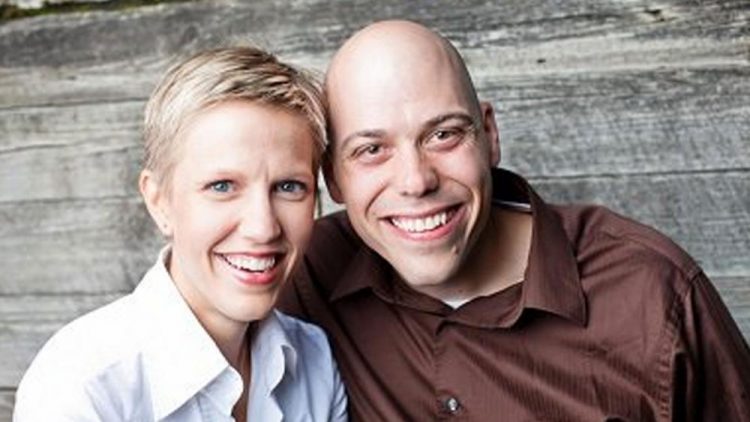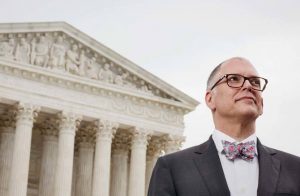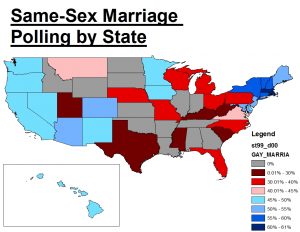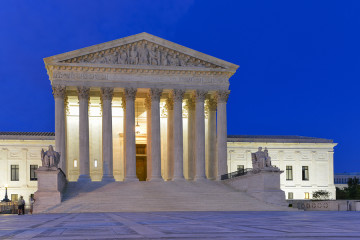State Tells Christian Filmmakers: Make Same-Sex Marriage Films or Spend 90 Days in Jail : A Well Thought Out Scream by James Riordan

Freedom of choice is an America right, one of the pillars of our nation. There must be some limits on that freedom, however. Your freedom of choice can not take away another person’s freedom of choice. Obviously, you can’t have the freedom to kill whomever you want because that takes away the victim’s freedom in a big way. That’s an easy one. Others are not so easy. If you open a store you can reserve the right to refuse selling to anyone you choose. But that can easily border on discrimination. If you operate a service of some kind, can you refuse to work with certain people. What if you’re a plumber who is asked to come into a neighborhood where there have been several muggings including some of service providers, like a carpenter and an electrician. Do you have to go? No, you don’t. What if you’re a baker who doesn’t want to bake a cake for a gay wedding? Do you have to treat these clients the same as you would any others? Yes, you do. Just like you cannot refuse service to someone who is Jewish or Black, you can not refuse to serve someone who is gay.
 But sometimes it is more complicated than that. Two Christian filmmakers will appear before the 8th Circuit Court of Appeals in St. Paul Tuesday to challenge Minnesota state law which they say illegally forces them to produce and create films expressing messages that contradict their core beliefs. Telescope Media Group owners Carl and Angel Larsen have already been threatened with hefty fines and up to 90 days in jail if they choose to disregard the law. The couple is being represented by the Alliance Defending Freedom (ADF). The Larsens want to enter the wedding industry. However, the state’s Human Rights Act stipulates if the couple creates films celebrating their Christian beliefs about marriage – that marriage is between one man and one woman, they must also create films about marriage that violate their beliefs, including films promoting same-sex marriages.
But sometimes it is more complicated than that. Two Christian filmmakers will appear before the 8th Circuit Court of Appeals in St. Paul Tuesday to challenge Minnesota state law which they say illegally forces them to produce and create films expressing messages that contradict their core beliefs. Telescope Media Group owners Carl and Angel Larsen have already been threatened with hefty fines and up to 90 days in jail if they choose to disregard the law. The couple is being represented by the Alliance Defending Freedom (ADF). The Larsens want to enter the wedding industry. However, the state’s Human Rights Act stipulates if the couple creates films celebrating their Christian beliefs about marriage – that marriage is between one man and one woman, they must also create films about marriage that violate their beliefs, including films promoting same-sex marriages.
Where is the line drawn? If you paint portraits, do you have paint anyone who meets your usual price? If you are a sculptor do you have to sculpt a powerful oil baron sitting at his desk because he can meet you price. Where is the line between artistic expression and discrimination?
“The government shouldn’t threaten filmmakers with fines and jail time to force them to create films that violate their beliefs,” said ADF Senior Counsel Jeremy Tedesco in a press release. “Carl and Angel are storytellers – they script, stage, conduct interviews, capture footage, select music, edit and more – all to tell compelling stories through film that promote their religious beliefs.”
T he U.S. Supreme Court ruled 7-2 in Masterpiece that the government must respect the belief—held by countless Americans from all walks of life—that marriage is between one man and one woman,” he continued. “The 8th Circuit should reinstate the Larsens’ lawsuit and order the state to stop forcing the Larsens to speak messages about marriage that violate their beliefs.”
he U.S. Supreme Court ruled 7-2 in Masterpiece that the government must respect the belief—held by countless Americans from all walks of life—that marriage is between one man and one woman,” he continued. “The 8th Circuit should reinstate the Larsens’ lawsuit and order the state to stop forcing the Larsens to speak messages about marriage that violate their beliefs.”
The Supreme Court is set aside a Colorado court ruling against the owner of Masterpiece Cakeshop who cited religious freedom and wouldn’t make a wedding cake for a same-sex couple. But the highest court in the land is not deciding the big issue in the case – whether a business can refuse to serve gay and lesbian people.
The Supreme Court justices’ limited ruling Monday turns on what the court described as anti-religious bias on the Colorado Civil Rights Commission when it ruled against baker Jack Phillips. They voted 7-2 that the Colorado Civil Rights Commission violated Phillips’ rights under the First Amendment.
The clash at the high court pitted Phillips’ First Amendment claims of artistic freedom against the anti-discrimination arguments of the Colorado Civil Rights Commission, and the two men Phillips turned away in 2012. The Denver-area baker cited his Christian faith in refusing to make a cake for their wedding celebration.
Phillips, owner of Masterpiece Cakeshop in Lakewood, was previously judged through multiple phases of litigation to have violated Colorado’s anti-discrimination law. Through his lawyers, he argued before the highest court in the land that he’s an artist who should not be compelled to create a cake that contradicts his religious views.
In his majority opinion, Justice Anthony Kennedy said that the issue “must await further elaboration.” Appeals in similar cases are pending, including one at the Supreme Court from a florist who didn’t want to provide flowers for a same-sex wedding.
The Department of Justice welcomed the ruling in a statement, saying they “pleased” the the court’s decision. “The Supreme Court rightly concluded that the Colorado Civil Rights Commission failed to show tolerance and respect for Mr. Phillips’ religious beliefs. In this case and others, the Department of Justice will continue to vigorously defend the free speech and religious freedom First Amendment rights of all Americans,” the Justice department said in a statement.
Senior Counsel Kristen Waggoner of the Alliance Defending Freedom who represented Philips said in a statement following the court’s ruling, “Jack serves all customers; he simply declines to express messages or celebrate events that violate his deeply held beliefs.”
 Waggoner added, “Creative professionals who serve all people should be free to create art consistent with their convictions without the threat of government punishment. Government hostility toward people of faith has no place in our society, yet the state of Colorado was openly antagonistic toward Jack’s religious beliefs about marriage. The court was right to condemn that. Tolerance and respect for good-faith differences of opinion are essential in a society like ours. This decision makes clear that the government must respect Jack’s beliefs about marriage.”
Waggoner added, “Creative professionals who serve all people should be free to create art consistent with their convictions without the threat of government punishment. Government hostility toward people of faith has no place in our society, yet the state of Colorado was openly antagonistic toward Jack’s religious beliefs about marriage. The court was right to condemn that. Tolerance and respect for good-faith differences of opinion are essential in a society like ours. This decision makes clear that the government must respect Jack’s beliefs about marriage.”
The justices threw out a 2017 ruling by Washington state’s Supreme Court that Barronelle Stutzman, owner of Arlene’s Flowers in the city of Richland, about 200 miles (320 km) southeast of Seattle, had violated the state’s anti-discrimination law and a consumer protection measure.
The court ordered the top Washington state court to revisit the case in light of its ruling on June 4 in favor of Colorado baker Jack Phillips, who similarly cited his Christian beliefs in refusing to make a wedding cake for a gay couple.
Stutzman in 2013 refused to provide the arrangements to Robert Ingersoll and Curt Freed, who were getting married after the state legalized same-sex marriage the prior year. She was hit with a $1,000 fine and directed to make floral arrangements for same-sex weddings if she does so for opposite-sex weddings.
Stutzman’s lawyers argue that such bias existed, noting that the state did not take action against the gay owner of a Seattle coffee shop who threw out anti-abortion activists. The activists said they were discriminated against because of their religious views.
 Washington state Attorney General Bob Ferguson has said there is no evidence of hostility against religion in Stutzman’s case.
Washington state Attorney General Bob Ferguson has said there is no evidence of hostility against religion in Stutzman’s case.
The Supreme Court’s 7-2 ruling in favor of Denver-area baker Jack Phillips left significant legal issues unresolved that the justices potentially could have addressed had they taken up the florist case.
Washington state’s Supreme Court last year rejected Stutzman’s argument that forcing her to create floral arrangements for a same-sex wedding would violate her free speech rights under the First Amendment of the U.S. Constitution and would be tantamount to endorsing same-sex marriage.
The couple was shocked and hurt by Stutzman’s refusal, stopped planning for a big wedding and decided to have a small wedding at their home, the ACLU said.
The state and the couple sued Stutzman in 2013, accusing her of violating the state anti-discrimination and consumer protection laws. A trial judge ruled against her in 2015, prompting the state Supreme Court to review the case.
In the baker ruling, the court’s five conservatives were joined by two liberals in issuing a narrow decision written by Justice Anthony Kennedy limited to the facts in that particular case.
Like the baker, Stutzman is represented by the conservative Christian group Alliance Defending Freedom, while the gay couples in both cases are represented by the American Civil Liberties Union.
Making the same argument that they did in the baker case, Stutzman’s lawyers said creating flower arrangements is a form of creative expression protected by the First Amendment and that she should not be forced to deliver a message through her work that she disagrees with.
Stutzman’s lawyers said she has had gay employees and was friendly with Ingersoll, who had been a long-time customer, before refusing to create the wedding floral arrangements.
In the case Obergefell v. Hodges, plaintiff James Obergefell argued that the state of Ohio should recognize his marriage to his partner.
Prior to Obergefell, same-sex marriage was legal to at least some degree in thirty-eight states, one territory (Guam) and the District of Columbia; of the states, Missouri, Kansas, and Alabama had restrictions. Until United States v. Windsor, it was only legal in 12 states and Washington D.C..
Obergefell v. Hodges is a landmark civil rights case in which the Supreme Court of the United States ruled that the fundamental right to marry is guaranteed to same-sex couples by both the Due Process Clause and the Equal Protection Clause of the Fourteenth Amendment to the United States Constitution. The 5–4 ruling requires all fifty states to perform and recognize the marriages of same-sex couples on the same terms and conditions as the marriages of opposite-sex couples, with all the accompanying rights and responsibilities.
Between January 2012 and February 2014, plaintiffs in Michigan, Ohio, Kentucky, and Tennessee filed federal district court cases that culminated in Obergefell v. Hodges. After all district courts ruled for the plaintiffs, the rulings were appealed to the Sixth Circuit. In November 2014, following a lengthy series of appeals court rulings that year from the Fourth, Seventh, Ninth, and Tenth Circuits that state-level bans on same-sex marriage were unconstitutional, the Sixth Circuit ruled that it was bound by Baker v. Nelson and found such bans to be constitutional. This created a split between circuits and led to an almost inevitable Supreme Court review.
Decided on June 26, 2015, Obergefell overturned Baker and requires all states to issue marriage licenses to same-sex couples and to recognize same-sex marriages validly performed in other jurisdictions. This established same-sex marriage throughout the United States and its territories. In a majority opinion authored by Justice Anthony Kennedy, the Court examined the nature of fundamental rights guaranteed to all by the Constitution, the harm done to individuals by delaying the implementation of such rights while the democratic process plays out,[6] and the evolving understanding of discrimination and inequality that has developed greatly since Baker.
Because one partner, John Arthur, was terminally ill and suffering from amyotrophic lateral sclerosis (ALS), they wanted the Ohio Registrar to identify the other partner, James Obergefell, as his surviving spouse on his death certificate, based on their marriage in Maryland. The local Ohio Registrar agreed that discriminating against the same-sex married couple was unconstitutional, but the state attorney general’s office announced plans to defend Ohio’s same-sex marriage ban.
As the case progressed, on July 22, District Judge Timothy S. Black granted the couple’s motion, temporarily restraining the Ohio Registrar from accepting any death certificate unless it recorded the deceased’s status at death as “married” and his partner as “surviving spouse”. Black wrote that “[t]hroughout Ohio’s history, Ohio law has been clear: a marriage solemnized outside of Ohio is valid in Ohio if it is valid where solemnized”, and noted that certain marriages between cousins or minors, while unlawful if performed in Ohio, are recognized by the state if lawful when solemnized in other jurisdictions. Ohio Attorney General Mike DeWine indicated he would not appeal the preliminary order. On August 13, Black extended the temporary restraining order until the end of December and scheduled oral arguments on injunctive relief, which is permanent, for December 18.
 In 2017, the Larsens tried to challenge the law as unconstitutional but a lower court dismissed their case and mandated that they service same-sex weddings or close this part of their business. They are now appealing to the 8th Circuit Court.
In 2017, the Larsens tried to challenge the law as unconstitutional but a lower court dismissed their case and mandated that they service same-sex weddings or close this part of their business. They are now appealing to the 8th Circuit Court.
According to the ADF, Minnesota officials have repeatedly stated that private businesses such as the Larsens’ violate the law if they decline to create films promoting same-sex weddings. Penalties for violation include payment of a civil penalty to the state; triple compensatory damages; punitive damages of up to $25,000; a criminal penalty of up to $1,000; and even up to 90 days in jail.
Now, on one hand, I believe an artist should be free to express his art the way he or she chooses. If the Larsens are making films about weddings that they select on an artistic basis, it is their freedom of choice to film what they want. If, however, they are open for hire and generally will film any wedding that hires them, then they are operating a public service that should be open to anyone no matter their race, creed or sexual persuasion.




No Comment